Archives: Services
ADHD

Attention-Deficit/Hyperactivity Disorder (ADHD) is a neurodevelopmental disorder that affects both children and adults, characterized by persistent patterns of inattention, hyperactivity, and impulsivity. These symptoms can significantly disrupt daily functioning in areas such as school, work, and personal relationships. ADHD is generally categorized into three types:
Inattentive Type: Predominantly characterized by inattention without significant hyperactive or impulsive symptoms. This type may often go unrecognized, especially in girls, who may be less disruptive and more prone to daydreaming.
Hyperactive-Impulsive Type: Marked by hyperactive and impulsive behaviors with less emphasis on inattention. Individuals may struggle to remain still, often moving around or acting without regard for social norms.
Combined Type: Features a mix of both inattentive and hyperactive-impulsive symptoms. This is the most common presentation and can lead to a wide range of challenges in various settings.

Symptoms
of ADHD
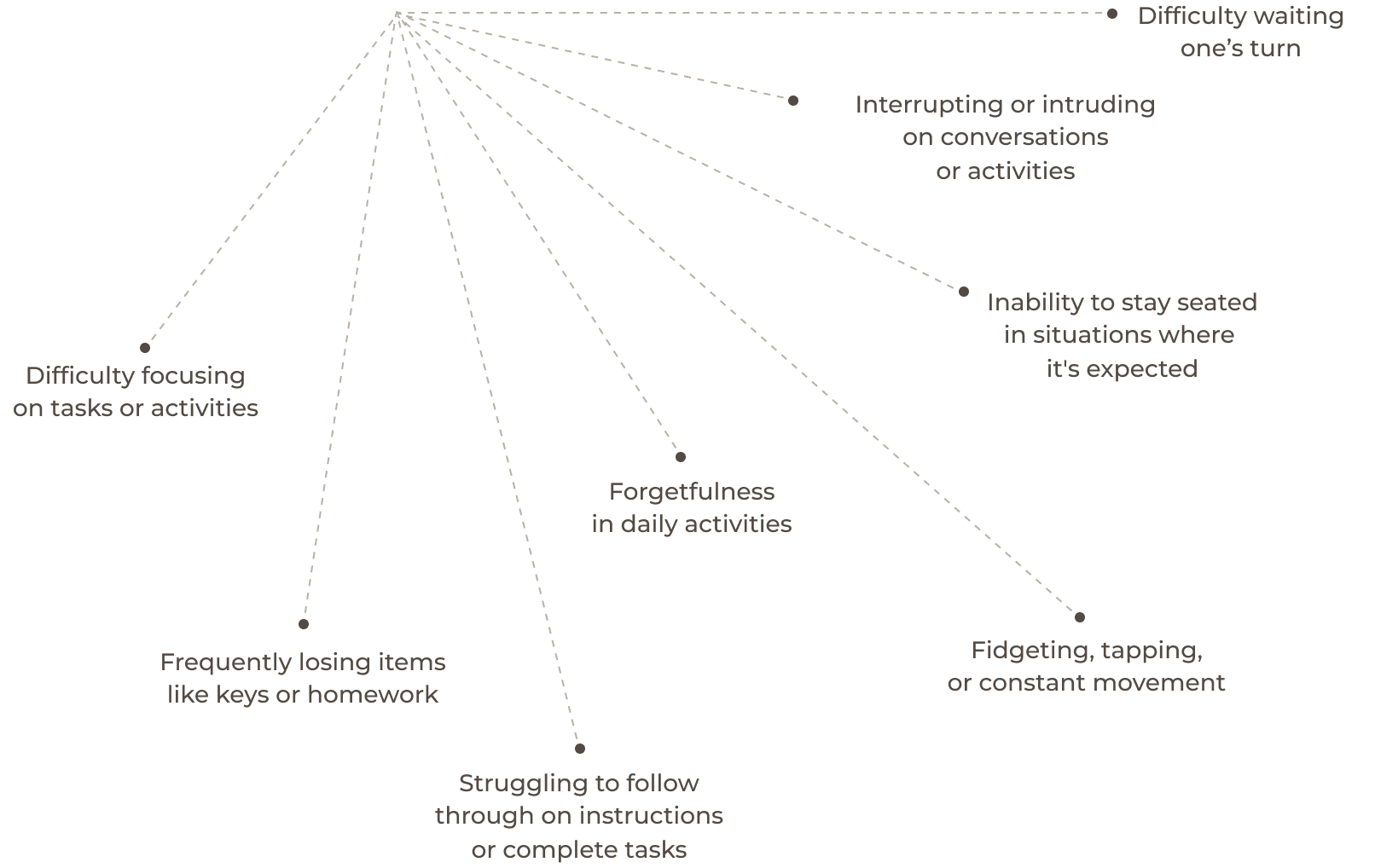
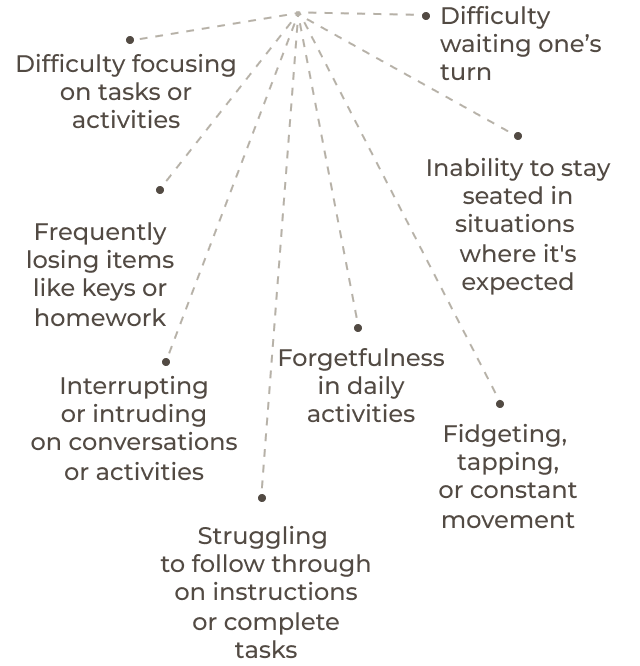

How We Can Help with ADHD

During this evaluation, we gather detailed information about your medical history, developmental background, and specific symptoms. Through a collaborative discussion, we assess how ADHD affects your daily life, including challenges related to attention, impulsivity, and organization. This thorough evaluation not only aids in accurately diagnosing ADHD but also helps identify any co-occurring conditions that may need to be addressed. Based on the findings, we develop a tailored treatment plan that may include therapy, medication options, and lifestyle recommendations, ensuring that the approach aligns with your unique needs and goals for managing ADHD effectively.
Medication management for ADHD is a tailored service designed to optimize treatment outcomes by carefully monitoring and adjusting medication to meet individual needs. This process begins with a comprehensive evaluation to determine the most effective medications, which may include stimulants like Adderall and Ritalin, as well as non-stimulant options. Through ongoing assessments, we monitor your response to medication, making adjustments as necessary to maximize benefits while minimizing side effects. The goal is to enhance focus, reduce impulsivity, and improve overall functioning in daily life. By providing personalized support and education about your treatment options, medication management empowers you to take an active role in your ADHD care.
Psychotherapy for ADHD is a valuable service designed to help individuals understand and manage the unique challenges associated with the disorder. Through collaborative discussions, we explore the impact of ADHD on daily life, including issues related to attention, impulsivity, and organization. The therapeutic process focuses on developing effective coping strategies, improving time management skills, and enhancing self-regulation. By addressing negative thought patterns and fostering self-awareness, psychotherapy can empower individuals with ADHD to navigate their personal and professional lives more successfully. Ultimately, the goal is to equip you with the tools needed to thrive while promoting overall mental well-being.
Laboratory monitoring and psychotropic genetic testing for ADHD are innovative services aimed at optimizing treatment and enhancing individual care. Laboratory monitoring involves regular assessments of health markers, such as liver function and electrolyte levels, to ensure the safe and effective use of medications, particularly stimulants. This ongoing oversight helps identify any potential side effects early on and allows for timely adjustments to the treatment plan. Psychotropic genetic testing, on the other hand, analyzes how your genetic makeup may influence your response to certain medications. By understanding your genetic predispositions, we can tailor medication choices more precisely, improving efficacy and minimizing adverse effects.
Let’s Connect!

Bipolar Disorder

Bipolar disorder is a mental health condition characterized by extreme mood swings that encompass emotional highs (mania or hypomania) and lows (depression). These shifts can vary in intensity and duration, significantly impacting a person’s behavior, energy levels, and overall ability to function. There are several types of bipolar disorder:
Bipolar I Disorder is marked by severe manic episodes lasting at least a week, which may require hospitalization, often followed by depressive episodes;
Bipolar II Disorder features hypomanic episodes that are less severe than full-blown mania, combined with major depressive episodes;
Cyclothymic Disorder includes periods of hypomanic and depressive symptoms that are milder but last for a longer duration.
Effective management of bipolar disorder typically requires a long-term approach, often involving a combination of medication, such as mood stabilizers and antipsychotics, along with therapy to help stabilize moods and enhance quality of life.

Symptoms
of Bipolar Disorder
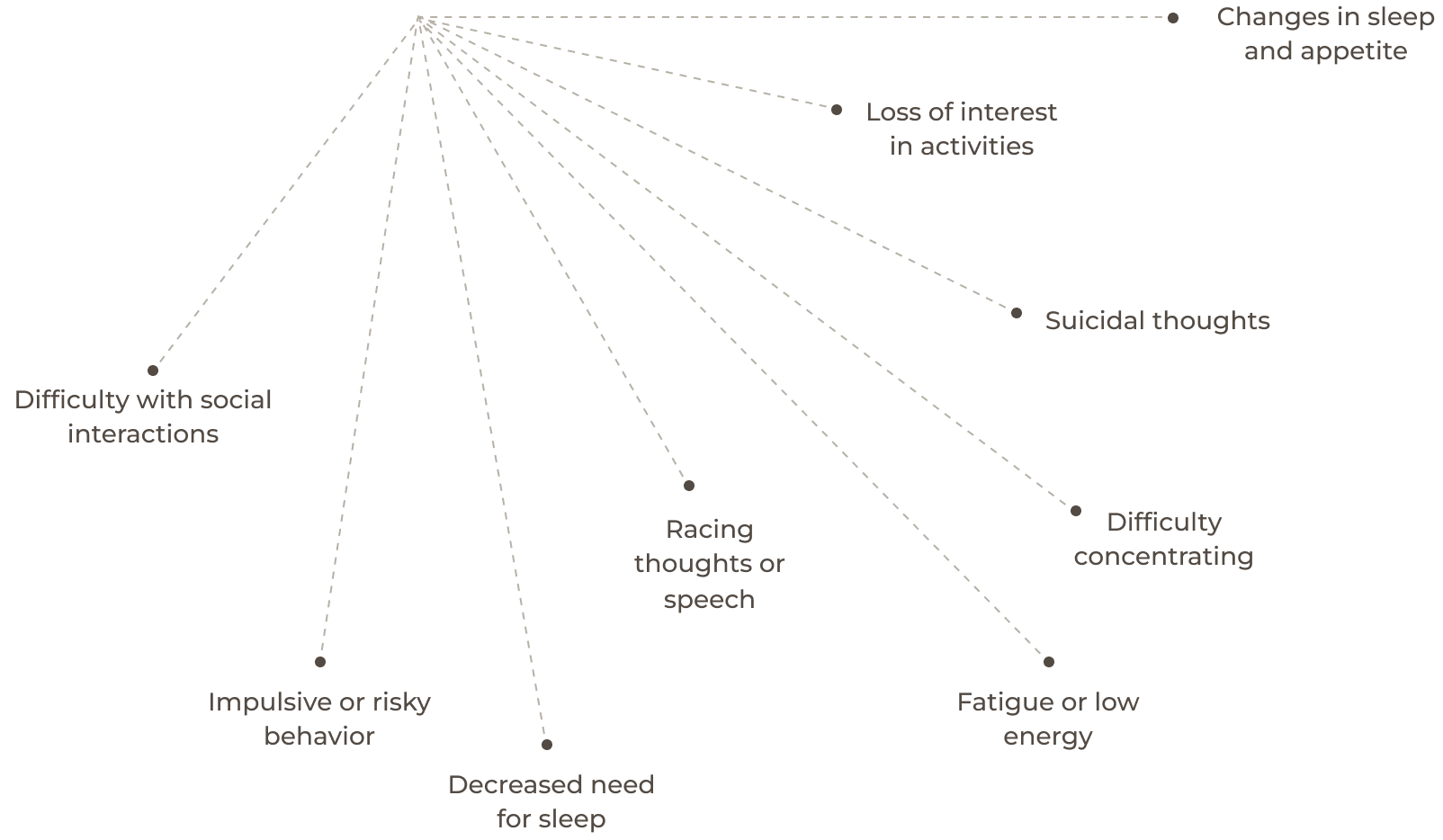
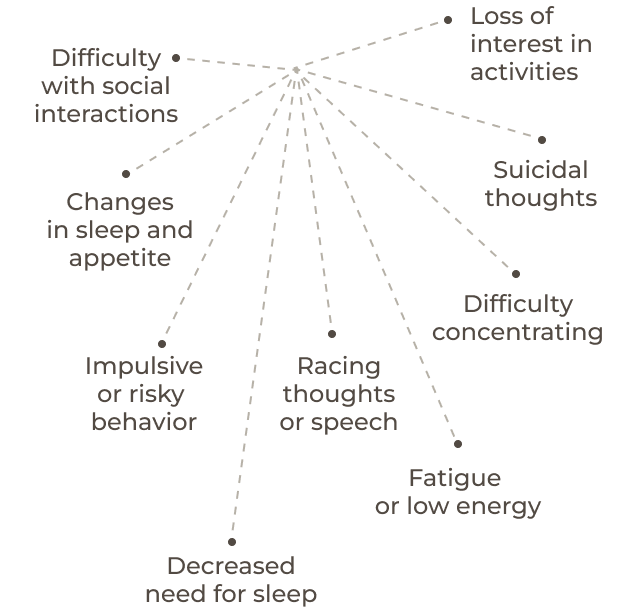

How We Can Help with Bipolar Disorder

An initial psychiatric evaluation is a crucial step in effectively diagnosing and managing bipolar disorder. During this comprehensive assessment, we gather detailed information about the individual’s medical history, symptoms, and personal circumstances. This evaluation aims to distinguish bipolar disorder from other mental health conditions, identify the specific type of bipolar disorder present, and assess the severity of mood episodes. By understanding the patient’s unique experiences and challenges, we can develop a tailored treatment plan that may include medication, therapy, and lifestyle recommendations.
Medication management is a vital service for individuals with bipolar disorder. It plays a key role in stabilizing mood and reducing the frequency and severity of episodes. A healthcare provider evaluates each patient and prescribes medications such as mood stabilizers, antipsychotics, and antidepressants, tailored to the specific needs of the patient. This approach empowers patients to engage actively in their care and ensures they receive the right dosage and combinations of medications. Effective medication management helps mitigate the symptoms of bipolar disorder and enhances overall well-being, allowing individuals to lead more balanced and fulfilling lives.
Through one-on-one sessions, we provide a safe space for patients to explore their thoughts, feelings, and behaviors related to their mood episodes. This therapeutic approach helps individuals develop coping skills, identify triggers, and enhance emotional regulation. Additionally, psychotherapy can improve self-awareness and foster a better understanding of the disorder, empowering patients to navigate challenges more effectively. By addressing underlying issues and promoting personal growth, individual psychotherapy complements medication management and leads to a higher quality of life for those living with bipolar disorder.
Lab monitoring involves regular assessments of blood levels and other health indicators to ensure that medications are working effectively and to detect any potential side effects. This process helps us make informed adjustments to the treatment plan as needed. Psychotropic genetic testing, on the other hand, analyzes an individual’s genetic makeup to predict how they may respond to specific medications. By identifying genetic factors that influence drug metabolism, this testing can guide personalized treatment choices, reducing the trial-and-error approach often associated with finding the right medication.
Let’s Connect!

PTSD

Post-Traumatic Stress Disorder (PTSD) is a mental health condition triggered by experiencing or witnessing a traumatic event, such as violence, natural disasters, physical or sexual assault, accidents, or combat. It involves intense, disturbing thoughts and feelings related to the event long after the trauma has ended.
PTSD can significantly interfere with a person’s ability to function in daily life. Relationships may suffer due to withdrawal, irritability, or emotional disconnect. Work performance can be impacted by difficulty concentrating or managing stress. The condition can also lead to co-occurring mental health issues, such as anxiety and depression.
Effective treatment for PTSD often includes a combination of therapy and medication, including Cognitive-Behavioral Therapy (CBT) and Eye Movement Desensitization and Reprocessing (EMDR).

Symptoms of PTSD
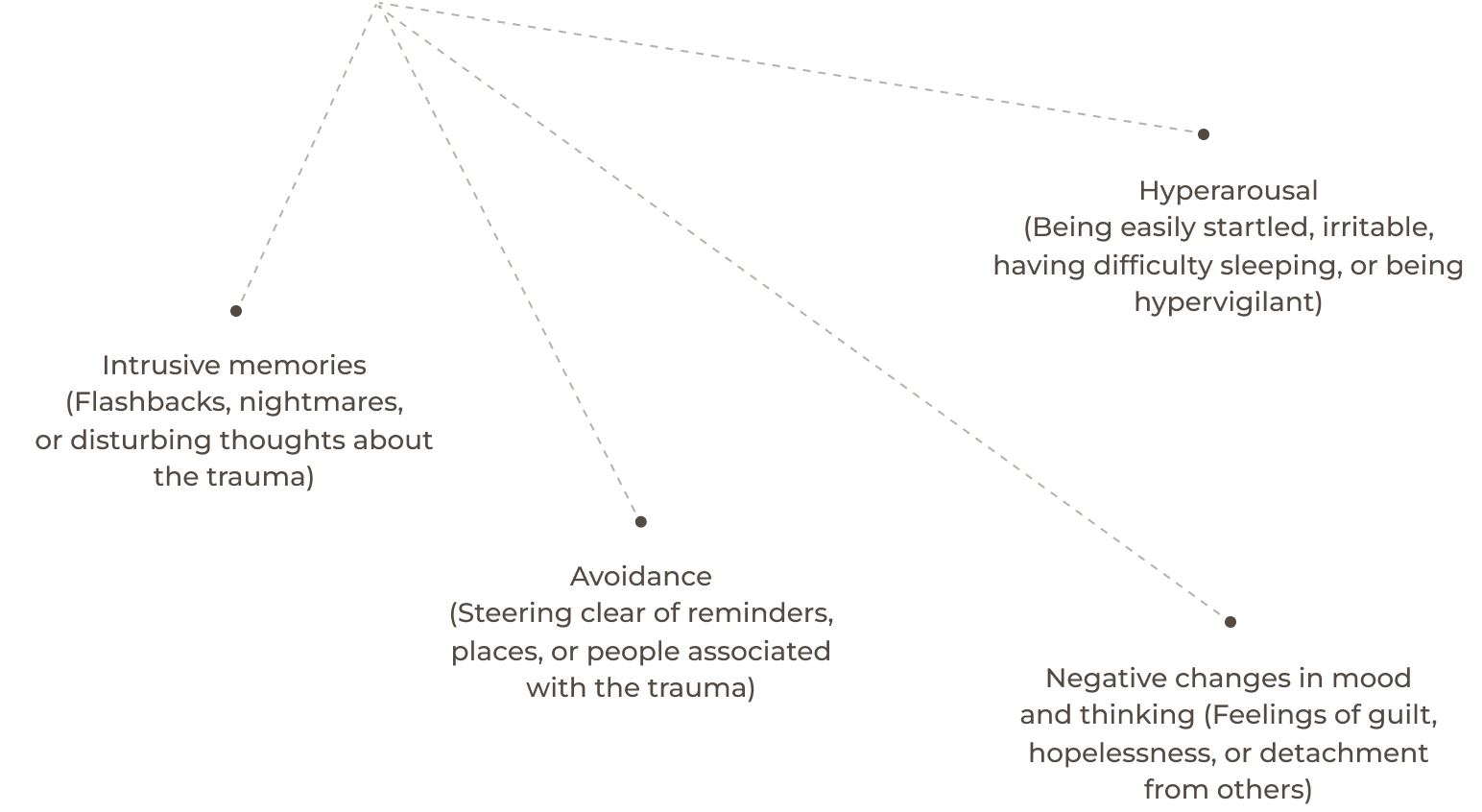
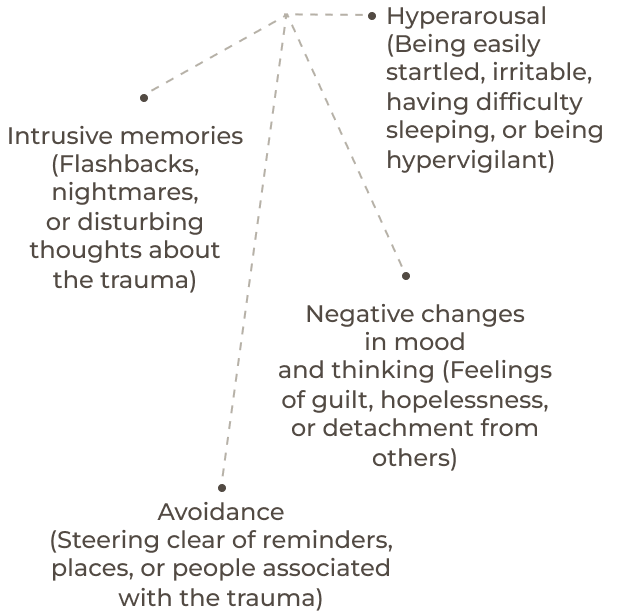

How We Can Help with PTSD

An initial psychiatric evaluation is a crucial service for individuals experiencing post-traumatic stress disorder (PTSD). During this comprehensive assessment, we gather detailed information about the individual’s trauma history, symptoms, and overall mental health. This evaluation aims for an accurate diagnosis of PTSD and differentiation from other mental health conditions. By establishing a thorough understanding of the individual’s experiences and challenges, we can recommend appropriate therapies, medications, and coping strategies. This foundational step helps create an effective treatment roadmap and provides the individual with a supportive environment to begin the journey toward healing and recovery.
Medication management is an essential service for individuals with post-traumatic stress disorder (PTSD) and plays a crucial role in alleviating symptoms and improving overall functioning. We prescribe medications such as antidepressants, anti-anxiety medications, or other psychotropic drugs tailored to the patient’s specific needs. Effective medication management can significantly reduce the impact of PTSD symptoms, enhance emotional stability, and promote a better quality of life for those affected.
During therapy sessions, we help PTSD patients explore their thoughts, feelings, and reactions related to the trauma. This therapeutic approach enables individuals to develop coping strategies, improve emotional regulation, and address negative beliefs associated with the trauma. Techniques such as cognitive-behavioral therapy (CBT) and exposure therapy are commonly used to help patients confront and reframe their experiences, ultimately leading to reduced symptoms and improved functioning. By fostering self-awareness and resilience, individual psychotherapy empowers individuals to navigate their recovery journey and enhance their overall quality of life.
Laboratory monitoring involves regular assessments that evaluate the effectiveness of prescribed medications and track any potential side effects to ensure that the treatment plan remains safe and effective. This proactive approach allows us to make timely adjustments to medication as needed. Psychotropic genetic testing analyzes a patient’s genetic profile to predict how they may respond to specific medications. By identifying genetic factors that influence drug metabolism, this testing helps tailor medication choices to each patient and reduce the risk of adverse effects and increasing the likelihood of treatment success. Together, these services promote a more personalized approach to managing PTSD and improve overall patient outcomes and quality of life.
Let’s Connect!

Depression

Depression is a common but serious mental health condition characterized by persistent feelings of sadness, hopelessness, and a loss of interest or pleasure in activities once enjoyed. It can also affect physical health, leading to changes in appetite, sleep disturbances, fatigue, and difficulty concentrating.
Depression can arise from a complex interplay of genetic, biological, environmental, and psychological factors. While it can occur in episodes, some individuals may experience chronic depression that lasts for years.
Treatment options are varied and can include psychotherapy, such as cognitive-behavioral therapy (CBT) or interpersonal therapy, and medications like antidepressants. Lifestyle changes, such as regular exercise, a balanced diet, and social support, can also play a crucial role in managing symptoms. Seeking help from a mental health professional is an important step toward recovery!

Symptoms
of Depression
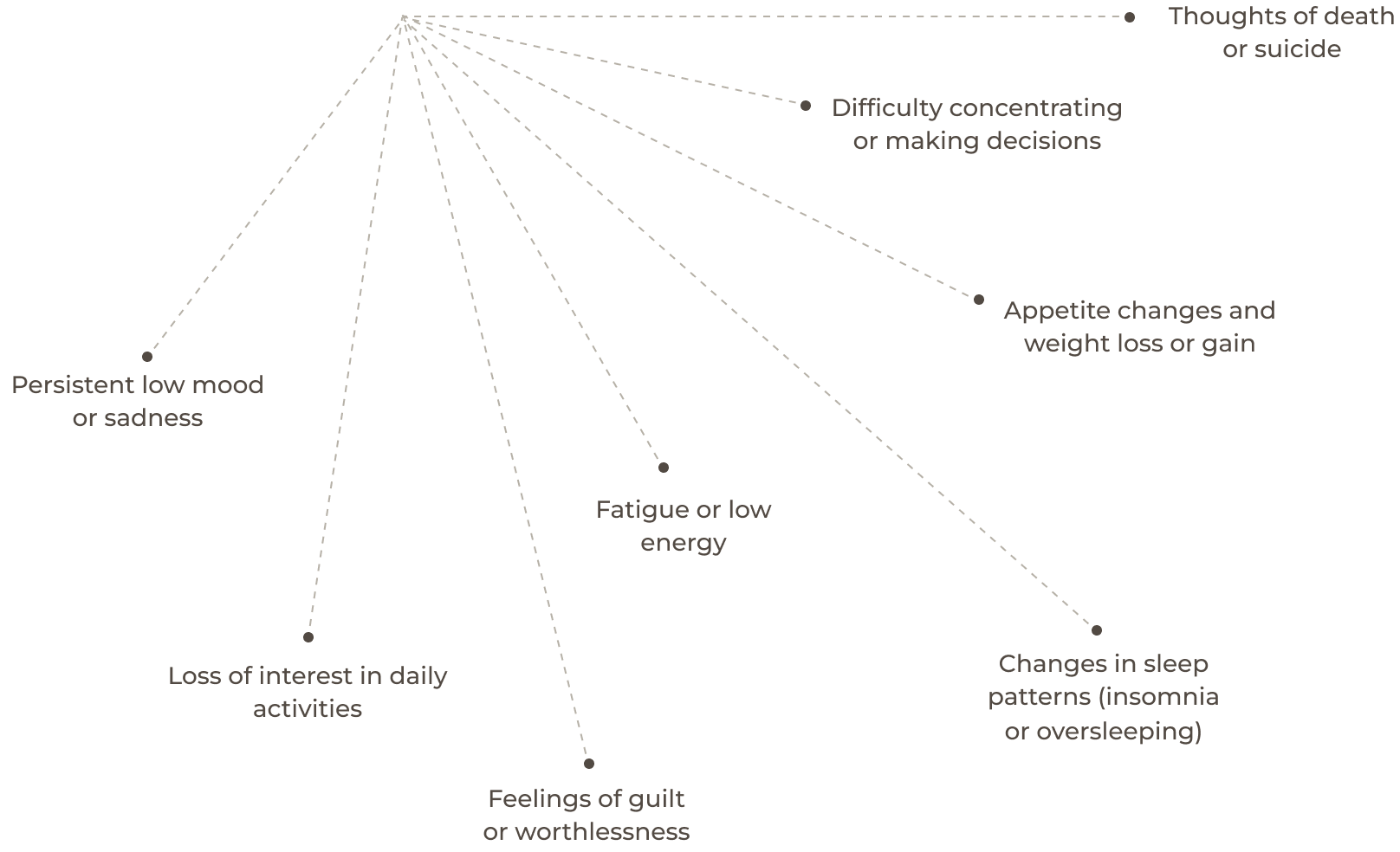
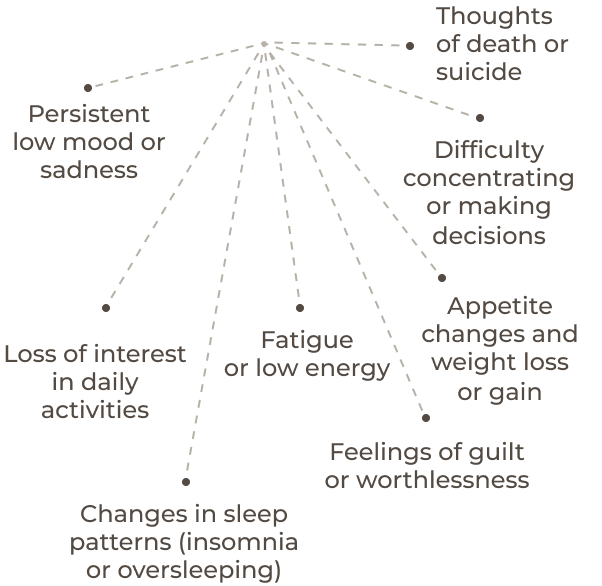

How We Can Help with Depression

During this comprehensive assessment, we gather detailed information about your medical history, emotional symptoms, and life circumstances. Through open dialogue, we explore how depression affects your daily functioning, relationships, and overall well-being. This thorough evaluation not only aids in accurately diagnosing depression but also helps identify any underlying issues or co-occurring conditions that may require attention. Based on the insights gained, we collaboratively develop a personalized treatment plan that may include therapy, medication options, and lifestyle changes, ensuring a holistic approach tailored to your specific needs and goals for recovery.
In our approach to medication management for depression, we adopt a conservative mindset, emphasizing the careful and judicious use of psychiatric medications informed by the latest scientific research and evidence-based practices. We remain updated on advancements in psychopharmacology to ensure our recommendations reflect the most effective and proven treatment options. Our primary goal is to maximize therapeutic benefits while minimizing potential risks and side effects. Whenever possible, we prioritize non-pharmacological interventions, recognizing the value of a comprehensive treatment strategy that addresses all aspects of your mental health.
Psychotherapy for depression is a structured and supportive service aimed at helping individuals navigate their emotional challenges. Through a collaborative approach, we engage in meaningful conversations that allow you to explore the root causes of your feelings and behaviors. This therapeutic process focuses on enhancing self-awareness, developing effective coping strategies, and fostering resilience. By addressing negative thought patterns and improving interpersonal skills, psychotherapy can lead to significant improvements in mood, relationships, and overall quality of life. Ultimately, the goal is to empower you with the tools needed to manage depression and promote lasting mental well-being.
Lab monitoring and psychotropic genetic testing for depression are essential services aimed at optimizing treatment outcomes and enhancing safety. Lab monitoring involves regular assessments to track key health markers, such as liver function and blood counts, ensuring that any medications prescribed are being well-tolerated and are effective in managing your symptoms. Psychotropic genetic testing analyzes your genetic profile to determine how your body may respond to certain antidepressants, helping to identify the most suitable medications for you. By understanding potential sensitivities and responses, we can tailor your treatment plan more precisely, improving efficacy and reducing the risk of side effects.
Let’s Connect!

Anxiety

Anxiety is a feeling of worry, fear, or nervousness that is a natural response to stress or perceived danger. However, when anxiety becomes chronic or excessive, it can interfere with daily life and well-being. Chronic anxiety can lead to several specific anxiety disorders:
Generalized Anxiety Disorder (GAD): Characterized by persistent, excessive worry about various aspects of life, such as health, work, and social interactions. People with GAD often find it difficult to control their anxiety, leading to physical symptoms like fatigue and muscle tension.
Panic Disorder: Involves recurrent, unexpected panic attacks—sudden periods of intense fear or discomfort. During these attacks, individuals may experience symptoms like heart palpitations, shortness of breath, and dizziness. This disorder often leads to fear of future attacks and avoidance of situations where they might occur.
Social Anxiety Disorder: Marked by intense fear of social situations and being judged or embarrassed. This can lead to avoidance of social interactions, which can severely impact relationships and daily functioning.

Symptoms
of Anxiety
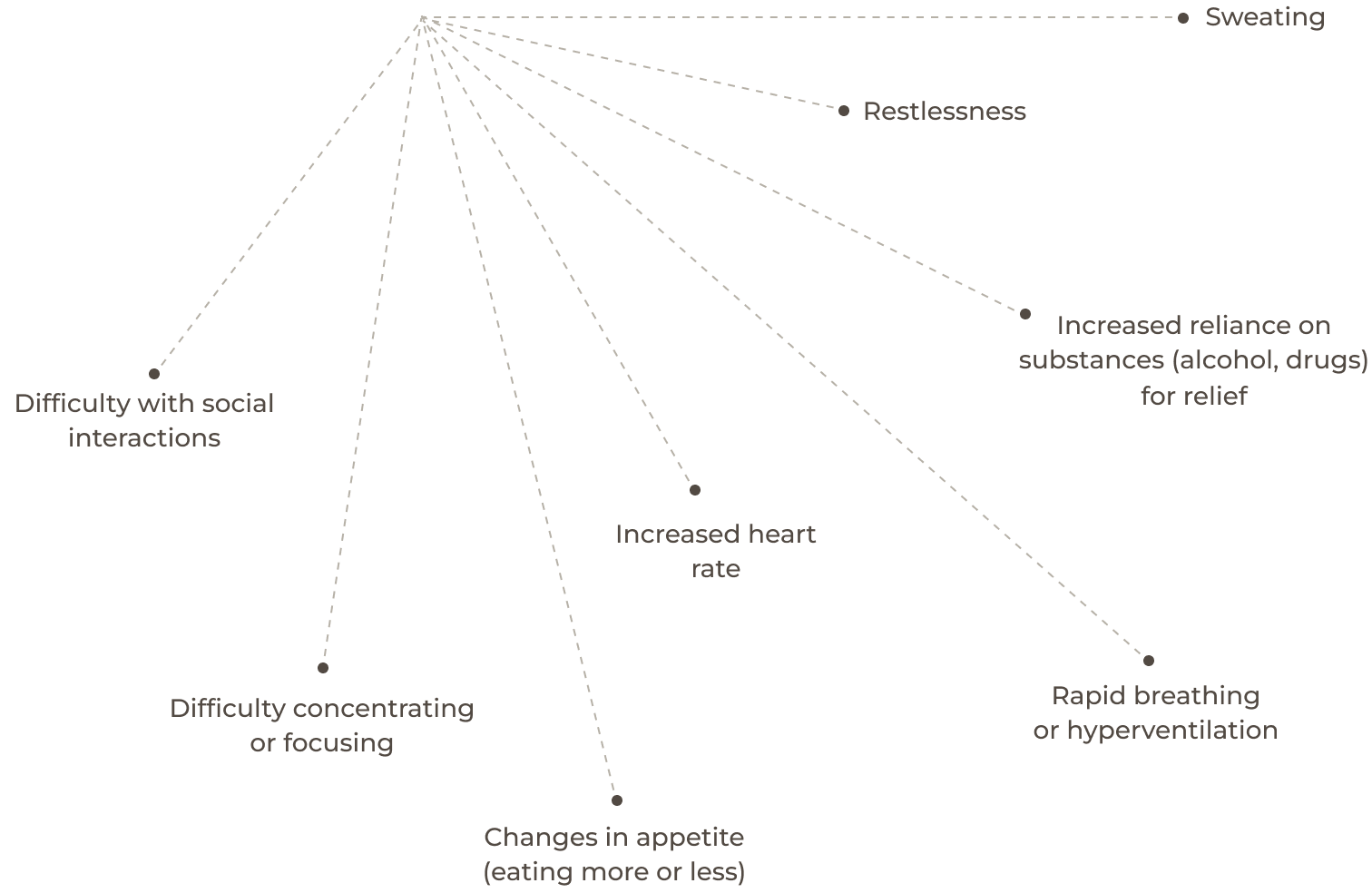
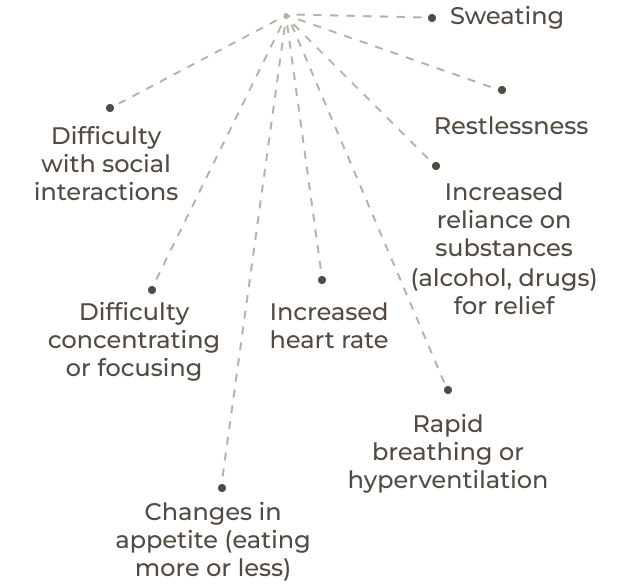

How We Can Help with Anxiety

During the initial psychiatric evaluation, we conduct a detailed interview to understand the patient’s symptoms, triggers, and impact on daily life. This process allows for accurate diagnosis and differentiation between various anxiety disorders, such as generalized anxiety disorder, panic disorder, and social anxiety disorder. With a clear understanding of the anxiety patient’s situation, we can create a personalized treatment plan that may include medication, therapy options, and coping strategies. This evaluation also provides a supportive atmosphere where patients can express their concerns and feel heard.
For patients facing anxiety, medication management serves as a cornerstone of effective treatment. Based on the comprehensive assessment, providers may prescribe various medications, such as SSRIs for long-term management or benzodiazepines for immediate relief. A comprehensive assessment guides the selection of the most appropriate medication based on the patient’s unique symptoms and medical history. The goal is to create a balanced treatment strategy that addresses both acute and chronic symptoms.
Individual psychotherapy serves as an effective intervention for those experiencing anxiety and provides a personalized exploration of thoughts and emotions. In therapy, we often use techniques such as cognitive-behavioral therapy (CBT) to help clients identify and modify unhelpful thought patterns that fuel their anxiety. This process equips individuals with practical tools to manage their symptoms, such as relaxation techniques and mindfulness practices. Sessions focus on recognizing triggers, improving emotional responses, and enhancing coping strategies, fostering greater resilience in the face of anxiety.
Laboratory monitoring and psychotropic genetic testing are essential services for patients managing anxiety, as they enhance the precision and safety of treatment. Laboratory monitoring involves regular evaluations to assess how well medications work and to detect any potential side effects early. This proactive approach enables healthcare providers to make timely adjustments to the treatment plan. Psychotropic genetic testing examines an individual’s genetic makeup to understand how they may respond to various medications. By identifying genetic factors that influence drug metabolism, this testing helps tailor medication choices and reduces the likelihood of adverse effects.
Let’s Connect!

